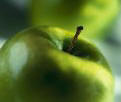FOR IMMEDIATE RELEASE:
April 12, 1999
UC DAVIS
STUDY SHOWS 100 PERCENT APPLE JUICE IS MORE NUTRITIOUS THAN PREVIOUSLY
THOUGHT
Significant amount of phytonutrients may help protect against heart disease.
(Sacramento, Calif.) - Researchers at UC Davis Medical
Center this week announced results of an in vitro study that found
antioxidants in apple juice help reduce levels of bad cholesterol and may
protect against heart disease. The discovery is reported in the April 16
issue of Life Sciences.
Apples, long considered part of a healthy diet, contain
phenols or
chemical compounds in their juice that are also found in other fruits and
vegetables. Those phenolic compounds have been shown to act as antioxidants
that help protect the body from injury, including the injuries of eating fat
in your diet. The antioxidants work by preventing the oxidation of low
density lipoprotein (LDL), or bad cholesterol, and have the potential to
guard the body against chronic heart disease, the leading cause of death in
this country.
Researchers tested six commercial apple juices, and the peel, flesh and
whole fruit of Red Delicious apples for various phenolic compounds. Only
juices containing 100 percent apple juice and no sugar were included in the
study. The juices and fresh apple extracts varied in the amount of
phenolic
concentrations, but all inhibited LDL oxidation. While further research is
needed to determine which juice components and
extracts specifically
contribute to the antioxidant activity, the study shows that 100 percent
apple juice is a nutritious addition to any healthy well-balanced diet.
Previous in vitro studies have indicated that several beverages including
wine, tea and grape juice have antioxidant components that may help reduce
levels of LDL. Now apple juice has been added to this list. It remains
unclear if and to what degree these phytochemicals, or plant-derived
compounds, are absorbed in the body in a metabolically active form, but
researchers agree that fruits and vegetables containing these beneficial
compounds contribute to healthy diets.
"While most people don't start paying attention to heart disease until
they are older, good nutrition is important at any age," says co-author Eric
Gershwin, chief of the Division of Rheumatology, Allergy and Clinical
Immunology at UC Davis School of Medicine and Medical Center. "In addition
to improving health, good nutrition helps young kids stay awake, do
homework, and have enough energy to exercise. All of these come from eating
sound diets including fruits and vegetables."
Dianne Hyson, a dietitian at UC Davis Medical Center, emphasizes that
this study is another reason for instilling a heart-healthy lifestyle in
young children as they are establishing habits that can make a big
difference in their health later.
"Children tend to like apple juice, and this new information indicates
there are more health benefits to drinking it than we thought previously,"
she says. "Past studies have focused on identifying antioxidants in other
foods. These new findings give us even more reason to emphasize apple juice
as a fruit serving."
As we age, our bodies produce harmful materials in our cells known as
oxidants; they affect arteries, skin and other organs in the body. Gershwin
compares these oxidants to sparks that age cells and cause damage.
Antioxidants, such as those found in apple juice, are able to prevent those
sparks from hurting the body.
"We found the amount and activity of antioxidants in apple juice to be
significant," Gershwin says. "In fact, if you went out and ordered a
hamburger, drinking apple juice or other phytonutrient-rich beverage would
help to protect your body against the fats in that burger."
A wide range of chronic diseases including heart disease and cancer
result from oxidation events; for example, the oxidation of LDL leads to
atherosclerosis.
"This study showed that we can actually reduce the oxidation of LDL
cholesterol," Hyson says. "So that has a significant impact on potentially
reducing the risk of that disease."
